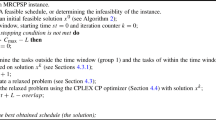Abstract
The multi-mode resource-constrained project scheduling problem (MRCPSP) is an important issue for industry, and has been confirmed to be an NP-hard problem. The particle swarm optimization meta-heuristic is an effective and promising method and well applied to solve a variety of NP application problems. MRCPSP involves two sub-problems: the activity mode selection and the activity order sub-problems. Therefore, a discrete version PSO and constriction version PSO were applied for solving these two sub-problems respectively. Discrete PSO is utilized for determining the activity operation mode, the constriction PSO is applied for deciding the activity order. To enhance the exploration and exploitation search so as to improve search efficiency, an S decreasing constriction factor adjustment mechanism was proposed. To verify the performance of proposed scheme, instances of MRCPSP in PSPLIB were tested and comparisons with other state-of-art algorithms were also conducted. The experimental results reveal that the proposed S decreasing constriction factor adjustment scheme is efficient for solving MRCPSP type scheduling problems.
Access this chapter
Tax calculation will be finalised at checkout
Purchases are for personal use only
Preview
Unable to display preview. Download preview PDF.
Similar content being viewed by others
References
Hartmann, S., Kolisch, R.: Experimental evaluation of state-of-the-art heuristics for the resource-constrained project scheduling problem. European Journal of Operational Research 127, 394–407 (2000)
Bouleimen, K., Lecocq, H.: A new efficient simulated annealing algorithm for the resource-constrained project scheduling problem and its multiple mode version. European Journal of Operational Research 149, 268–281 (2003)
Nonobe, K., Ibaraki, T.: Formulation and tabu search algorithm for the resource constrained project scheduling problem. In: Ribeiro, C.C., Hansen, P. (eds.) Essays and Surveys in Metaheuristics, pp. 557–588. Kluwer Academic Publishers (2001)
Peteghema, V.V., Vanhoucke, M.: A genetic algorithm for the preemptive and non-preemptive multi-mode resource-constrained project scheduling problem. European Journal of Operational Research 201, 409–418 (2010)
Chiang, C.W., Huang, Y.Q., Wang, W.Y.: Ant colony optimization with parameter adaptation for multi-mode resource-constrained project scheduling. Journal of Intelligent and Fuzzy Systems 19, 345–358 (2008)
Chen, R.M., Wang, C.M.: Project Scheduling Heuristics Based Standard PSO for Task-Resource Assignment in Heterogeneous Grid. Abstract and Applied Analysis 2011, Article ID 589862, 20 pages (2011)
Jarboui, B., Damak, N., Siarry, P., Rebai, A.: A combinatorial particle swarm optimization for solving multi-mode resource-constrained project scheduling problems. Applied Mathematics and Computation 195, 299–308 (2008)
Marinakis, Y., Marinaki, M.: A Hybrid Multi-Swarm Particle Swarm Optimization algorithm for the Probabilistic Traveling Salesman Problem. Computers & Operations Research 37, 432–442 (2010)
Liu, B., Wang, L., Jin, Y.H.: An Effective PSO-Based Memetic Algorithm for Flow Shop Scheduling. IEEE Transactions on Systems, Man, and Cybernetics 37, 18–27 (2007)
Shen, H., Zhu, Y., Liu, T., Jin, L.: Particle Swarm Optimization in Solving Vehicle Routing Problem. In: Intelligent Computation Technology and Automation, pp. 287–291 (2009)
Kennedy, J., Eberhart, R.: Particle swarm optimization. In: IEEE International Conference on Neural Networks, vol. 4, pp. 1942–1948 (1995)
Bratton, D., Kennedy, J.: Defining a Standard for Particle Swarm Optimization. In: IEEE Swarm Intelligence Symposium, pp. 120–127 (2007)
Kennedy, J., Eberhard, R.C.: A Discrete Binary Version of the Particle Swarm Algorithm. In: IEEE Conference on Systems, Man, and Cybernetics, Piscataway, vol. 5, pp. 4104–4109 (1997)
Kolisch, R., Hartmann, S.: Heuristic algorithms for the resource-constrained project scheduling problem: Classification and computational analysis. In: Weglarz, J. (ed.) Project Scheduling, Recent Models, Algorithms and Applications, ch. 7, pp. 147–178. Kluwer Academic Publishers, Norwell (1999)
Shi, Y., Eberhart, R.C.: Parameter selection in particle swarm optimization. In: Proceedings of 7th Annual Conference on Evolution Computation, pp. 591–601 (1998)
Nickabadi, A., Ebadzadeh, M.M., Safabakhsh, R.: A novel particle swarm optimization algorithm with adaptive inertia weight. Applied Soft Computing 11, 3658–3670 (2011)
Lei, K., Qiu, Y., He, Y.: A new adaptive well-chosen inertia weight strategy toautomatically harmonize global and local search ability in particle swarm optimization. In: ISSCAA, pp. 977–980 (2006)
Adriansyah, A., Amin, S.H.M.: Analytical and empirical study of particle swarm optimization with a sigmoid decreasing inertia weight. In: Regional Conference on Engineering and Science, Johor (2006)
Józefowska, J., Mika, M., Różycki, R., Waligóra, G., Węglarz, J.: Simulated annealing formulti-mode resource constrained project scheduling. Annals of Operations Research 102(1-4), 137–155 (2001)
Jarboui, B., Damak, N., Siarry, P., Rebai, A.: A combinational particle swarm optimization for solving multi-mode resource-constrained project scheduling problem. Applied Mathematics and Computation 195(1), 299–308 (2008)
Lova, A., Tormos, P., Cervantes, M., Barber, F.: An efficient hybrid genetic algorithm for scheduling projects with resource constraints and multiple execution modes. International Journal of Production Economics 117, 302–316 (2009)
Ranjbar, M., De Reyck, B., Kianfar, F.: A hybrid scatter-search for the discrete time/resource trade-o_ problem in project scheduling. European Journal of Operational Research 193, 35–48 (2008)
Author information
Authors and Affiliations
Editor information
Editors and Affiliations
Rights and permissions
Copyright information
© 2013 Springer-Verlag Berlin Heidelberg
About this paper
Cite this paper
Chen, RM., Wang, CM. (2013). Controlling Search Using an S Decreasing Constriction Factor for Solving Multi-mode Scheduling Problems . In: Ali, M., Bosse, T., Hindriks, K.V., Hoogendoorn, M., Jonker, C.M., Treur, J. (eds) Recent Trends in Applied Artificial Intelligence. IEA/AIE 2013. Lecture Notes in Computer Science(), vol 7906. Springer, Berlin, Heidelberg. https://doi.org/10.1007/978-3-642-38577-3_56
Download citation
DOI: https://doi.org/10.1007/978-3-642-38577-3_56
Publisher Name: Springer, Berlin, Heidelberg
Print ISBN: 978-3-642-38576-6
Online ISBN: 978-3-642-38577-3
eBook Packages: Computer ScienceComputer Science (R0)




